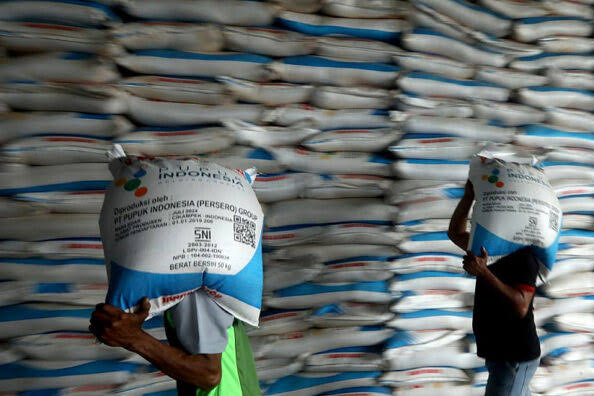Streamlining Fertilizer Access: A Call to Action for Indonesia’s Farmers
Indonesia’s agricultural sector is poised for a significant boost, thanks to a proposed Presidential Regulation aimed at simplifying the distribution of subsidized fertilizers. This move comes as a direct response to mounting concerns about an inefficient bureaucratic system that has hampered the timely delivery of essential supplies to farmers nationwide.
Tackling Bureaucratic Bottlenecks:
A recent hearing between lawmakers and executives from PT Pupuk Indonesia, the state-owned fertilizer holding company, underscored the urgency for reform. Nasim Khan, a prominent member of the House of Representatives’ Commission VI, highlighted the complexity and convoluted nature of the current distribution chain as the primary culprit behind slow fertilizer absorption rates.
“This problem is more related to government regulations,” Khan emphasized, during the hearing on Monday, December 2, 2024, “starting from the Ministry to the regional government, which subsequently fail to appropriately target the farmer groups in need.”
Khan’s observations echo a growing concern within the agricultural community: the existing system often falls short of reaching its intended beneficiaries, leaving farmers grappling with limited access to vital resources. By the end of the distribution period, the process often only achieves 50 percent of its target, directly impacting farmer productivity and overall agricultural output.
Simplifying Distribution, Empowering Farmers:
PT Pupuk Indonesia’s own report paints a telling picture of the current distribution landscape. As of November 30, 2024, the company had distributed 6.7 million tons of subsidized fertilizer, representing 88.9 percent of the 7.54 million-ton target. This figure includes 3.2 million tons of NPK fertilizer, 3.4 million tons of urea fertilizer, and 40 thousand tons of organic fertilizer.
While these figures demonstrate a substantial effort, Rahmad Pribadi, President Director of Pupuk Indonesia, clearly articulated the need for a more streamlined approach. “The bureaucratic chain from the Ministry to farmers is too long,” he stated. “With this Presidential Regulation, distribution is expected to be simpler so that farmers can get fertilizer more easily.”
Towards a More Efficient Future:
The proposed Presidential Regulation offers a ray of hope for Indonesia’s farmers. By cutting through bureaucratic red tape, the goal is to ensure that subsidized fertilizers reach their intended recipients in a timely and efficient manner. This, in turn, is expected to lead to increased crop yields, improved farmer livelihoods, and a stronger agricultural sector overall.
But the path towards achieving these goals demands a multifaceted approach. Alongside streamlining distribution channels, Khan emphasizes the critical need for robust supervision to prevent misuse and diversion of subsidized fertilizers. “Supervision must involve the provincial police and the Military Regional Command (Kodam) to minimize misappropriation, such as fertilizer sold above the Highest Retail Price (HET),” he stressed.
The proposed Presidential Regulation is more than just a policy change; it’s a commitment to supporting Indonesia’s farmers and unlocking the full potential of its agricultural sector. In doing so, it promises to pave the way for a more prosperous future for both farmers and the nation as a whole.
* What specific steps are being taken to simplify the fertilizer distribution chain and reduce bureaucratic hurdles, as mentioned in the proposed Presidential Regulation?
## Streamlining Fertilizer: Easier Access, Better Harvests for Indonesian Farmers
**[INTRO MUSIC]**
**Host:** Welcome back to the show. Today we’re discussing a critical issue facing Indonesia’s farmers: access to fertilizers. I’m joined by Nasim Khan, a prominent member of the House of Representatives’ Commission VI, who has been vocal about the need for reform. Mr. Khan, welcome to the programme.
**Nasim Khan:** Thank you for having me.
**Host:** Mr. Khan, Indonesia’s agricultural sector is crucial to the nation’s economy, yet we’re hearing concerns about fertilizers not reaching farmers efficiently. Can you shed some light on this issue?
**Nasim Khan:** Absolutely. Currently, the system for distributing subsidized fertilizers is overly complex and bureaucratic. This convoluted process leads to significant delays, meaning farmers often don’t receive the resources they need when they need them.
**Host:** Your commission recently held a hearing on this topic with PT Pupuk Indonesia, the state-owned fertilizer company. What were some key takeaways from that discussion?
**Nasim Khan:** The hearing confirmed what many of us already knew – the problem primarily stems from a lack of clear targeting and coordination between government ministries and regional levels. As a result, the delivery system often misses its mark, leaving many farmers struggling with limited access to fertilizers.
**Host:** We’ve seen reports that only about 50% of the targeted fertilizer distribution actually reaches farmers. What are the implications of this shortfall?
**Nasim Khan:** The consequences are significant. Optimal fertilizer usage is vital for improving crop yields and boosting agricultural productivity. When farmers face shortages, it directly impacts their harvests, incomes, and ultimately, national food security.
**Host:** There’s talk of a new Presidential Regulation to streamline fertilizer access. Can you tell us more about this proposed solution?
**Nasim Khan:** The proposed regulation aims to simplify the distribution chain by reducing bureaucratic hurdles and improving coordination between stakeholders.
The goal is to ensure timely and equitable access to fertilizers for farmers across Indonesia.
**Host:** This sounds promising. What are the next steps in this process, and what message do you have for Indonesia’s farmers?
**Nasim Khan:** We hope this regulation will be finalized and implemented quickly. It’s vital that we listen to the voices of our farmers and prioritize their needs. This new system has the potential to significantly improve their livelihoods and strengthen our nation’s agricultural sector for the better.
**Host:** Mr. Khan, thank you for your time and insights on this important issue.
**[OUTRO MUSIC]**



